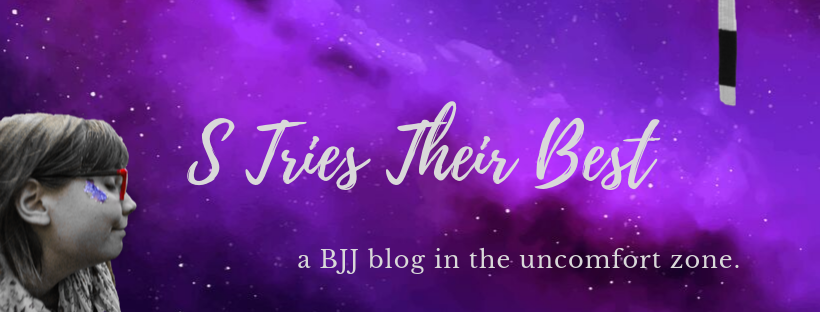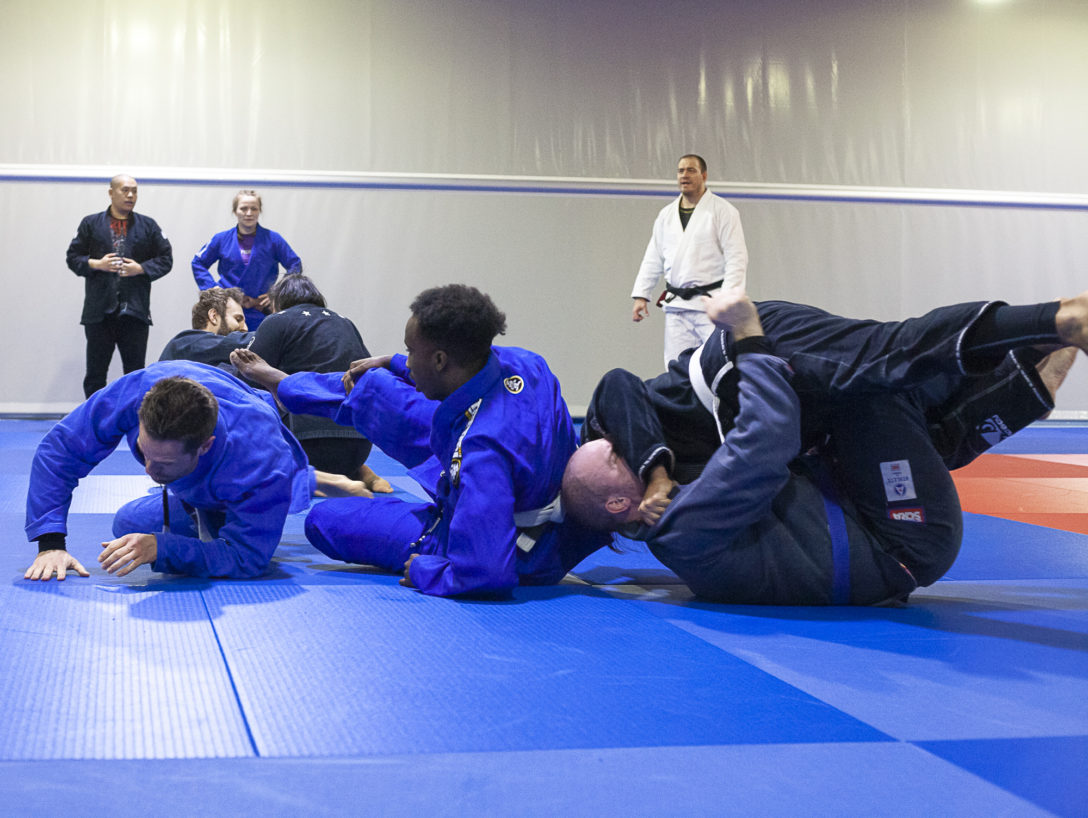I know very little about jiu-jitsu, but I like to think I know a bit about fostering successful communities. If you are a gym owner, instructor or otherwise an member of influence in your local gym who wishes for a vibrant BJJ community, this article is for you. I hope you take the time to read this argument for DEI (Diversity, Equity and Inclusion) work in BJJ and take on board some ideas to start with.
The Background for this Post
2021 was the first year me, a fat, disabled queer nonbinary white belt, truly felt connected to a wider community of Brazilian Jiu-Jitsu practitioners. I started BJJ in 2018, and if I didn’t love the art so much I might not have stuck with it. Lofty ideals of chosen families and true honour aside, this scene provides ample opportunities for messed-up hierarchies, the exploitation of vulnerable people and downright abuse and criminal behaviour. All in the name of superficial sportsmanship and promised personal growth.
After a couple of years of grinding my teeth and wondering if I’m just sensitive, the floodgates opened. News about sexual, physical, psychological, even financial abuse within the sport wasn’t new, but it was discussed like never before. With the amount of personal stories being brought forward, it has become harder to ignore that many practitioners have been unnecessarily scarred by BJJ. If you do not find this acceptable, do read on. If you are old school, I would still ask you to read on. Embracing DEI can help with
- student recruitment and retention
- student’s progression in the art
- building a solid reputation as a respectable gym
- fostering a sense of belonging in the gym community
- emotional skills development of students and instructors alike
- access to training premises, funding or other operational necessities for the gym.
This blog does not cover the question of how to create successful professional or semi-professional BJJ athletes. I am a white belt with professional and personal experience and interest in promoting inclusivity work, not a sport psychologist. Most BJJ practitioners are what we call hobbyists, and an inclusive community is more likely to keep their interest.
As Diversity, Equity and Inclusion are frequently used interchangeably, let’s first define the terms.
Diversity in Society and BJJ Communities
Diversity denotes a variety of something. When referred to a group of people, it refers to a community where individuals are distinctively different from one another. Thus, a diverse group consists of more than just one type of person.
In political decision-making, human rights work, and organisational codes of conduct, diversity is often defined along the lines of “a society consisting of a variety of people of different genders, races/ethnicities, first languages, physical abilities and disabilities, ages, socioeconomic backgrounds, religions, political affiliations and other traits”. BJJ in the West still predominantly is the pursuit of white, young or youngish able-bodied cis men with a lot of time, disposable income, or both. Therefore, the presence of women or people of colour in a gym is sometimes provided as a litmus test when shopping for a relaxed, friendly place to train. If people out of the norm frequent a gym, it is seen as a more diverse gym and therefore a safer bet.
However, the mere presence of different groups of people does not yet mean a community is inclusive or practices equity.
Inclusion: is Everyone Feeling at Home?
Inclusion in a diverse community means that all those different sorts of people are happy, valued and secure as respected members of their team or community.
If you never ask your students how they feel about their training environment, you might not notice the discomfort some of them grapple with that doesn’t have anything to do with actual BJJ. Some examples:
- A purple belt, a former star competitor, is now a father of two with a demanding job. He only has time to train every now and then. Every time he turns up, he has to listen to “funny” japes from instructors and training partners alike how he has gone soft. He wonders why he keeps turning up somewhere where he is always ridiculed. It’s less fun than when he was a 19 year-old white belt.
- A small girl, a white belt, only wants to train with other women. An instructor takes her aside to discuss how she is hindering her own progress if she doesn’t get comfortable training with people of all genders and sizes. She is too humiliated to say she is worried the men will injure her.
- On his personal social media page, one of the instructors voices vehement displeasure about an MMA athlete who is an openly transgender woman. He misgenders the athlete, uses slurs and says anyone training the athlete should be ashamed of themselves. Several students express severe anxiety about the outburst and do not want to attend the instructor’s classes anymore. You tell them that to your knowledge, the instructor has a track record of being a good and fair BJJ teacher, so they shouldn’t worry. One of the students switches gyms, another never attends the instructors’s class again.
Equity: How to Make it Happen?
Ensuring your BJJ gym is truly inclusive, not just diverse, almost never happens by itself. If you accept and admit that some groups of people require a bit of extra attention to thrive within the community, you are on your way to practising equity. In DEI work equity refers to actions, processes and practices that recognise hierarchies and power imbalances in the community. Actions of equity in a BJJ gym might entail:
- Including inclusive values and practices of equity in a written set of rules/code of conduct all gym members are expected so sign.
- Briefing instructors on what sort of gym culture you want to see and how it can be maintained.
- Offering concessions in memberships to certain groups of people, such as children, students, and people with little disposable income.
- Having some classes targeted towards to certain segments of the membership, such as classes for women, children or competitors.
- Not allowing the use of slurs on the gym premises or social channels such as group chats.
- Recruiting designated instructors or students as promoters of community welfare. This role can include serving as a Ask Me Anything -type of support for new white belts, being someone students can bring their problems to with discretion etc.
Why Your Local BJJ Community Needs DEI
It is not rocket science: people need to enjoy the community to remain active in it. A sense of belonging helps people to continue with BJJ, and it is a great shame if valuable gym members move to train elsewhere or quit the art entirely because they do not feel they fit in. I personally do not enjoy Disappearing Blue Belt jokes. What if it is not a lack of commitment that makes so many BJJ students quit after receiving their blue belt? What if they started feeling like their gym never committed to them?
If your business model or sport club plan does not include becoming the School of Hard Knocks, you benefit more from an inclusive approach to your students. The only requirement should be a love, or at least a curiosity, of folding laundry with people inside it/involuntary yoga/insert your favourite BJJ joke definition here. Committing to DEI will not always be easy, but it’s the way to go.
Further reading
Roll the same – a community working for safe, inclusive BJJ spaces.
Don’t Break the Game – campaign for respecting human rights in sports by Finnish NGO. Calls for full equity of all genders, sexual and gender minorities, races/ethnicities and more in sport spaces and communities.
Seven Pillars of Inclusion – a resource provided by the Australian Inclusive Sport Design
Equality Planning Resources by the Finnish Olympic Committee (In Finnish) – BJJ is not an Olympic sport, but here’s information for Finnish community members
Diversity and inclusion self-assessment tool for organisations – focused on working life, but some sections are applicable for BJJ gyms as well
What is DEI (Diversity, Equity, and Inclusion)? – if you’re busy, here’s a three-minute video on the basics

